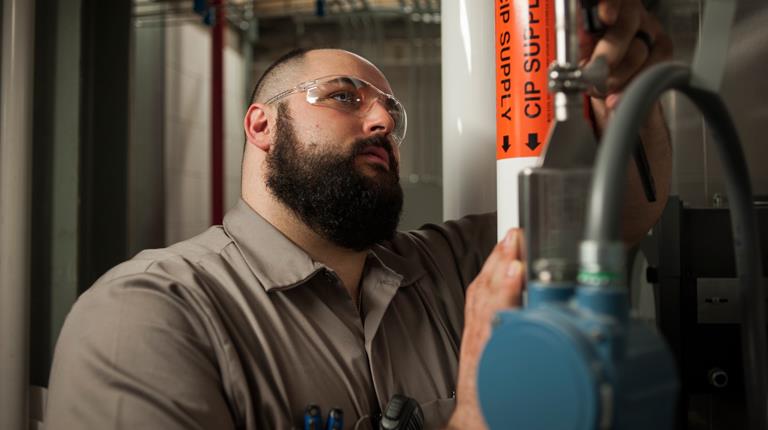Christopher Gotschall grew up wanting to drive a truck and work on cars, just like his dad, who taught him how to repair and build things.
“My dad never hired work out. He always did it himself,” Chris noted. “I was the beneficiary of his knowledge.”
Chris’ dream after high school was to attend a technical school and work on cars for a living. “I’m really into cars,” grinned Chris. Circumstances prevented that, so he learned to drive a truck.
After spending the early part of his career as a semi-truck driver, Chris felt it was time for a change and in 2009 started a role at CSL Behring’s world-class manufacturing facility in Kankakee, Illinois. The facility produces life-saving medicines that treat people with rare and serious diseases around the world.
“I’ve always liked doing things with my hands, fixing things, making things better,” he said.
Chris worked in the Parenteral Manufacturing, Packaging, and Plasma Fractionation departments before earning a maintenance technician position – a highly coveted role at the site. That’s because they are skilled positions, with a higher base wage, often filled with employees with high seniority.
Positions like this are what are known as “middle-skill” jobs. Middle-skill jobs require education beyond high school but not a four-year degree. According to the National Skills Coalition, they make up the largest part of the labor market in the United States and in each of the 50 states.
Historically, there have been few opportunities for interns, with openings going to those with experience, education, seniority or all three. With the increasing demand for skilled maintenance technicians due to facility expansion and retirements, there was a real need to develop a talent pipeline for these roles.
All too often, industries are unable to find enough sufficiently trained workers to fill these jobs. According to the Bureau of Labor Statistics, in 2015, in Illinois, 53 percent of all jobs were middle-skill. A National Skills Coalition analysis of long-term projections from state labor/employment agencies, the demand for middle-skills jobs in Illinois will remain strong through 2024.
Enter the partnership between CSL Behring and Kankakee Community College. Together, they developed a program that is filed with the U.S. Department of Labor, and more importantly, provides a roadmap for filling skilled maintenance roles at CSL Behring.
During the three-year apprenticeship, the workers will complete an Associate in Applied Science degree. They will work at the CSL Behring facility three days per week in hands-on maintenance positions. Two days per week, they will be students in the Kankakee Community College Industrial Electrical Technology program. During the three years, participants will be eligible for merit-based wage increases and responsibilities at CSL Behring. Their training and expertise will contribute to CSL Behring’s reliability to produce life-saving medicines for people stricken with rare and serious diseases.
Chris had applied for maintenance openings over the years, but didn’t have the seniority to secure a position.
“That all changed with the apprenticeship program,” Chris explained. “In addition to tenure, applicants were required to demonstrate their mechanical aptitude and go through a series of interviews. I was one of the four selected for the first group.”
When he was notified of his selection for the program, Chris remarked, “I was literally jumping up and down in my kitchen. My 2-year old got excited, too.”
When asked how the rest of the maintenance crew was responding to the new program, he said the experienced technicians and the supervisors are very helpful. They are very willing to pass on their knowledge, both on the job and with coursework.
Maintenance manager, Mike Memenga, agrees, “There has been a lot of positive feedback. There were many technicians who volunteered to be mentors to the apprentices, which also meant training for them. Their support is key to the program’s success.”
The schedule for the program is a plus for work/life balance, too, notes Chris, “I don’t have to worry about when or how to get my homework done. I don’t have to worry that I’ll be forced to work overtime, interfering with my ability to go to class. It helps reduce the pressure of balancing work and family life. I really appreciate that with two young children at home.”
Memenga is looking forward to the success of the program, noting that there is a shortage in the labor market for qualified maintenance technicians, seeing this program as a way to fill that gap, “Through our partnership with Kankakee Community College, we were able to put together a very focused, worthwhile program that should benefit not only CSL Behring, but the Kankakee community for years to come.”



